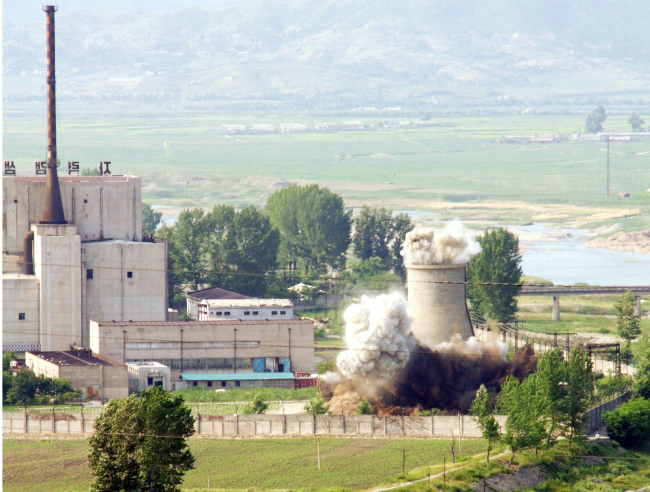북한은 2일 영변의 5MW급 흑연감속로를 정비해 재가동할 계획을 밝혔다. 북한은 2007년 6자 회담을 통해 영변 핵시설의 가동을 중단했으며, 이번 조치는 이전 합의를 깨는 것이다.
북한 원자력총국 대변인은 2일 조선중앙통신을 통해 “현존 핵 시설들이 용도를 병진노선에 맞게 조절변경해 나가기로 했다”고 밝히며 “여기에는 우라늄 농축공장을 비롯한 영변의 모든 핵시설들과 함께 2007년 10월 6자 회담 합의에 따라 가동을 중지하고 무력화하였던 5MW 흑연감속로를 재정비, 재가동하는 조치도 포함된다”고 발표했다.
북한은 지난 달 31일 노동당 중앙위원회 전원회의에서 경제 건설과 핵무력 건설을 동시에 추진하는 병진노선을 채택하였다. 흑연감속로 재가동은 병진노선의 구체 과업인 ’자립적 핵동력고업 발전 및 경수로 개발 사업 추진’의 일환이다.
흑연감속로는 1986년에 설립되었으며, 폐연료봉에서 플루토늄을 추출해 핵무기를 제조하는데 사용된다. 해당 시설은 ‘2•13 합의’와 ‘10•3 합의’에 따라 봉인된 바 있다.
이에 대해 익명을 요구한 외교부 관리는 냉각 타워 재건과 재처리 시설 복구를 포함한 재가동 과정을 위해 대략 일 년이 걸릴 것으로 예상된다고 말했다.
현재 북한은 사용후 연료봉 8,000 개를 재처리 한 것으로 알려졌으며, 이는 매년 플로토늄 7 킬로그램 축출해 최소 핵분열 폭탄 한 발을 생성할 수 있는 양이다.
이에 외교부는 2일 북한의 흑연감속로 재가동 선언에 대해 유감 표명과 더불어 합의준수를 촉구했다.
조태영 외교부 대변인은 이날 오후 세종로 정부서울청사 별관에서 정례브리핑을 통해 “보도가 사실이라면 대단히 유감스럽다”며 입장을 밝혔다.
조 대변인은 “북한은 그간 이뤄진 합의들을 지켜야 할 것이며, 한반도 비핵화를 유지해야 한다”며 “정부는 상황을 계속 예의주시할 계획”이라고 말했다.
이어서 “현재 북한의 도발 위협이 계속되고 있는 엄중한 상황이라고 받아들이고 있다”며 “전 정부 부처가 긴밀히 협조하고 공조하면서 만반의 태세를 갖추고 있다”고 덧붙였다.
(코리아헤럴드 신현희 기자/ 번역 이상주)
<관련 영문 기사>
N.K. vows to restart graphite-moderated reactor
By Shin Hyon-hee
North Korea said Tuesday it will restart its graphite-moderated nuclear reactor to extract plutonium for nuclear weapons, breaching its 2007 agreement and inviting international criticism.
The official Korean Central News Agency said the regime would “adjust and change its existing nuclear facilities” in line with its new two-pronged policy of building atomic arms and boosting the economy, citing a spokesman for the General Department of Atomic Energy.
“This applies to uranium enrichment plants and all other facilities at the Yongbyon nuclear complex and includes refurbishing and reactivating the 5-megawatt graphite-moderated reactor that was halted and disabled according to the six-party agreement in October 2007,” it said.
“Ahead of our atomic energy field is the critical task of resolving the country’s strained electricity supply by developing a self-reliant nuclear power industry, and expanding and reinforcing nuclear forces until the world’s denuclearization is realized.”
The announcement came a day after North Korea adopted a statement putting nuclear programs and economic development at the top of the national agenda during a parliamentary session presided over by leader Kim Jong-un.
It will likely spur concern in South Korea and the U.S. following Pyongyang’s daily threats including a warning of nuclear strikes targeting their territories.
Seoul immediately expressed deep regret of the North’s latest action.
“North Korea must stick to its previous agreements and promises,” Foreign Ministry spokesperson Cho Tai-young told a news briefing.
Unification Ministry spokesman Kim Hyung-suk said the decision indicates Pyongyang’s attempt to extract plutonium, rescind earlier deals made since the 1990s and undermine the Nuclear Nonproliferation Treaty that it signed in 1985 and walked away from in 2003.
“The situation is serious and worrying. They’re saying the reactor’s reactivation falls in step with the new parallel policy including power generation, but in fact it means an expansion of its nuclear weapons arsenal in terms of mass and quantity,” he told The Korea Herald.
China, the North’s ally and economic sponsor, also expressed regret and urged all six-party members to return to dialogue, saying sanctions cannot “solve the problem fundamentally.”
“China has consistently argued for the realization of denuclearization on the Korean Peninsula, and peace and stability on the Korean Peninsula and in Northeast Asia,” Foreign Ministry spokesman Hong Lei said at a briefing, adding that the current situation is “sensitive and complicated.”
Established in 1986, the reactor had been used to reprocess spent fuel rods to take out plutonium as the fissile material for its atomic weapons and was closed as part of an agreement of the six-nation denuclearization talks in 2007.
The resumption process is expected to take a year including reerecting the cooling tower and recovering reprocessing equipment, another government official said on condition of anonymity due to the sensitivity of the issue.
If fully restored, reprocessing its some 8,000 fuel rods that are used for one year could yield about 7 kilograms of plutonium, sufficient to make at least one fission bomb a year, experts say.
“(North Korea) appears to be trying to play all the cards it has,” the official said.
The regime began installing a 50-megawatt and 200-megawatt reactor in 1984 but their construction was suspended after its 1994 deal with the U.S.
Pyongyang has ratcheted up tension since the U.N. Security Council levied a new round of sanctions to punish its Feb. 12 atomic test, and Seoul and Washington started their annual military drills early this month.
Sunday’s statement called nuclear weapons “the nation’s life” and a core asset of its defense that could not be traded for billions of dollars, citing the U.S. military presence in South Korea as the main reason for its drive to build missiles and nuclear weapons.
The North has also threatened in recent days to shut down the inter-Korean factory complex in Gaeseong, fueling fears among thousands of workers of detention and a possible local armed clash.
Kim last week vowed to retaliate against the U.S.’ dispatch of strategic and stealth bombers to the peninsula, calling it an “ultimatum to wage a nuclear war.”
“The series of North Korea’s threats since its third nuclear test bespeaks that Kim Jong-un’s confidence has exponentially risen,” said Sohn Yong-woo, a professor at Hannam University’s Graduate School of National Defense Strategy in Daejeon.
“There’s a high possibility this year for the immature leader to create an armed conflict in the West Sea to flaunt his credentials at home, strengthen his father’s ‘military-first’ policy and tighten his grip over the military.”
(
heeshin@heraldcorp.com)








